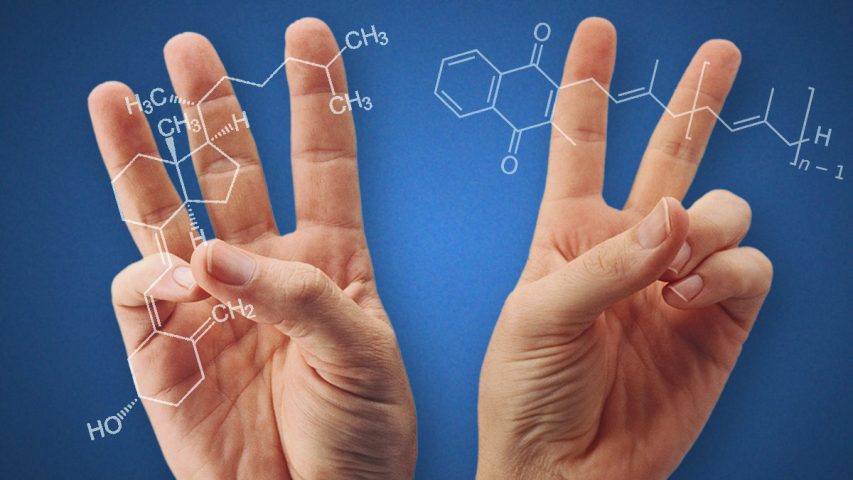- Have any questions? Contact us!
- info@dr-rath-foundation.org

New Dr. Rath Interview: Cutting The Death Rate From Heart Attacks In Half – In Just One Generation
September 10, 2021
‘Positive Associations’ Found Between Vitamin D And Cognition In Elderly
September 17, 2021Vitamins D3 and K2: Understanding the Synergy

In previous articles we discussed the benefits of vitamin D and vitamin K when used individually. While these two fat-soluble vitamins have many health benefits, they work best when combined.
Vitamin D by itself is important for maintaining strong bones and a healthy cardiovascular and immune system. It also has anti-cancer properties. The two different types of vitamin D are D2 (ergocalciferol), present in plant-based products such as mushrooms, and D3 (cholecalciferol), present in animal products and fatty fish. It is well known that vitamin D is needed for the effective absorption of calcium from the digestive system, and promoting its mobilization towards the bones. It also helps in regulating the calcium-phosphorus ratio required for healthy bones.
Vitamin D3 works together with vitamin K2 in maintaining calcium balance in the body, affecting the activation of the bone protein (osteocalcin) responsible for the incorporation of calcium in the bones. In clinical trials, a combination of vitamin D3 and vitamin K2 (especially the vitamin K subtype MK-7) increased bone density in postmenopausal women with osteoporosis more effectively than each vitamin taken individually or a placebo.
Besides bone health, the interaction between vitamins D and K in relation to cardiovascular health has been receiving growing research interest. Vitamin K is known for its roles in blood coagulation, as an antioxidant, and in immune system functions, among many others. Its subtype K1 (phylloquinone) is present in leafy greens, while K2 (menaquinone) is found in fermented foods. Both vitamins K1 and K2 are necessary for blood clotting.
Special attention has been paid to the interaction between vitamin K and vitamin D in the aspect of regulating calcium deposition in the blood vessels. Increased vascular calcification and blood vessel hardening have severe consequences, such as heart attacks or strokes. In this aspect, Vitamin K2 plays an important role in preventing calcium from depositing in the blood vessels, channeling it instead to the bones by activating a specific protein (matrix GLA).
Clinical trials conducted in type-2 diabetes patients with heart disease showed that a combination of vitamin D3 and vitamin K2 had desirable effects on carotid artery thickness and insulin metabolic markers. Positive cardiovascular effects have been shown in studies in postmenopausal women and healthy populations. However, more studies are warranted. It has been shown that the vitamin K2 subtype MK-7 has a higher bioavailability and may be of particular importance in cardiovascular health for ensuring that calcium and other minerals are not deposited in the blood vessels, but reach the bones where they are most required.
The immune-modulating actions and cardio-respiratory protective properties of vitamin D3 have been the focus of many research studies during the current pandemic. Low levels of vitamin D3 have also been noted in severely ill COVID-19 patients with other comorbidities. However, administering vitamin D3 alone may not be the best solution. As described above, when vitamin D3 is taken with vitamin K2, they work together to maintain calcium balance. But when vitamin D3 is taken without vitamin K2 it exacerbates the deposition of calcium in blood vessels and other soft tissues, including the lungs. This can cause acute lung damage and respiratory distress. Moreover, vitamin K2 is necessary for blood clotting, and has an anti-inflammatory role.
A deficiency of vitamins D3 and K2 could lead to blood clots and widespread inflammation. Respiratory failure, thrombosis, cytokine storm, and multiple organ damage have disastrous outcomes in COVID-19 patients. Although clinical trials are still underway, many vitamins, including D3 and K2, are already being given in ICU settings to reduce the severity of COVID-19.



